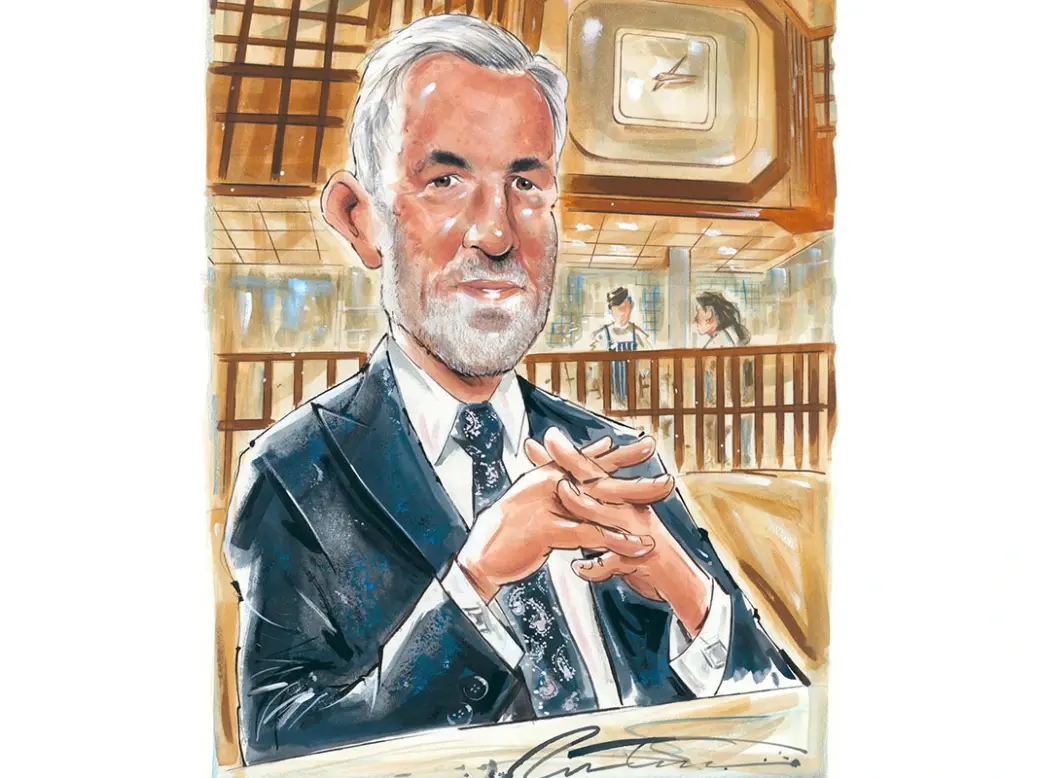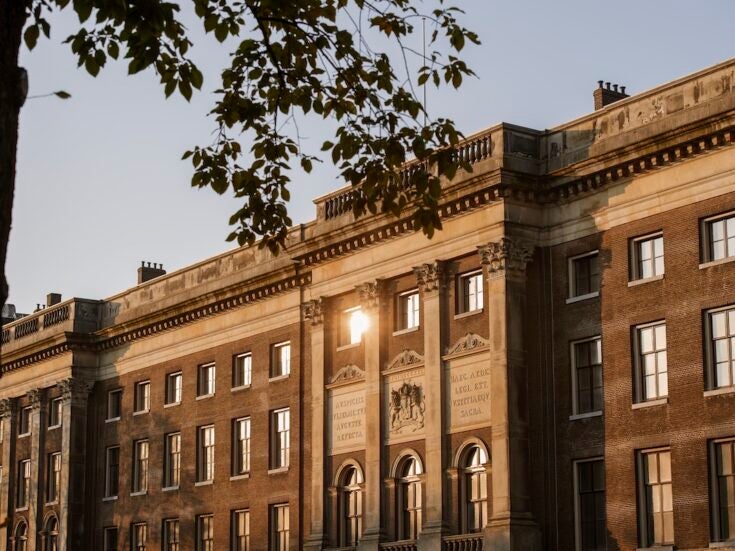
Jeremy King is a head-turner. Towering at 6ft 5in and impeccably dressed, it’s impossible not to notice the man known as the ‘gentleman giant’ of London’s fine-dining scene as he weaves through Maison François towards our table. He is 10 minutes early and on the phone, yet still stops to introduce himself, living up to his reputation for being unfailingly courteous.
‘Sorry about that,’ he says moments later, smoothing the lapels of his Timothy Everest suit as he slides into our banquette. (Former home secretary Amber Rudd, ex-wife of AA Gill, the late restaurant critic and King’s close friend, is seated on the table behind.)
[From the magazine: A rising tide: how Vanguard is making its presence felt in the UK]
King, 69, chose the venue for our lunch, which was a relief, as the pressure of trying to impress the man responsible for Le Caprice, the Ivy and the Wolseley might have been too much to bear. Maison François, a buzzy brasserie in St James’s, embodies many of the qualities that King values in his own grands cafés – the style of restaurant for which he is famous. It’s unpretentious, with ample corner seating (a ‘generous’ decision which creates more ‘conversation spaces’) and a flexible menu that satisfies a range of tastes and budgets.
‘An exciting grand café will have someone having coffee on one table; champagne and caviar on the next; steak frites on a third; and another table having afternoon tea,’ he says. ‘The moment restaurants become prescriptive and controlling, they become boring.’
Boardroom vs the restaurant floor
King is so well versed in the menu here that he orders an alcohol-free Lucky Saint beer without looking; later followed by a glass of 2021 Corbières Vieilles Vignes, Château Fontarèche, Languedoc. His lack of snobbishness (and mention of steak frites) prompts me to suggest a portion of french fries to share with our mains: a quarter poulet rôti and halibut.
[From the magazine: The Spy who Banked Me: how the City shaped James Bond]
‘That’s the eponymous “François” of Maison François,’ says King after we’ve ordered, waving at an aproned François O’Neill as he carries a trio of plates past our table. ‘The problem with the restaurant business at the moment is that it’s becoming dominated by restaurant owners rather than restaurateurs,’ he continues. ‘Restaurateurs do it from the floor, and there is no greater exemplification of that than François. Whereas restaurant owners do it from the boardroom. And you can tell. Decisions are made in the boardroom that would never be made on the floor.’
King knows this from experience, to his cost. In April 2022 a long-running boardroom saga culminated in King being messily – and publicly – ousted from Corbin & King, the company he co-founded in 2003 with business partner Chris Corbin. (Corbin stepped back from the business several years ago). Thai hotel conglomerate Minor International, headed up by American-born Thai billionaire William Heinecke, which had amassed a 74 per cent stake in the group behind the Wolseley, the Delaunay, Brasserie Zédel and others, forced the company into administration. A battle for the entire business ensued. King and his supporters were eventually outbid and Minor took control. (The group is now known as the Wolseley Hospitality Group.)
[From the magazine: How golf became a driving force for property developers]
It was sudden and harsh. King was reportedly forced to hand over his company phone and laptop. He later wrote in his email newsletter, whose 900-strong mailing list reportedly includes Dame Joan Collins, Sir Paul Smith and a number of FTSE 100 CEOs, that he’d been made to ‘walk away… without so much as a “goodbye”.’
King devotees were devastated. Regulars such as Robert Peston vowed never to set foot in a Corbin & King restaurant again. Food critics penned glowing tributes to the group’s golden age. Hospitality heavyweights such as Nigella Lawson, Ruth Rogers and Hawksmoor CEO Will Beckett picked up the phone to sing his praises to journalists. Yet it didn’t take long for the relentlessly forward-looking King to see it as an opportunity in disguise. ‘It might have been, in retrospect, the best thing that could happen to me,’ he wrote in an email three months later.
Now, after almost two years ‘off the floor’, King is back to reclaim his throne. Under the new Jeremy King Restaurants umbrella, he will open three London restaurants in 2024.
Jeremy King on rebuilding his kingdom
King arrived at our lunch following a trip to Bayswater, where work is under way on the Park, a new 215-cover restaurant set to open at the end of May. Set within the glass-fronted ground floor of Fenton Whelan’s Park Modern development, it will be a 21st-century take on one of his signature grands cafés, drawing from other influences too.
‘I thought, “If people like Danny Meyer, Stephen Starr, Jonathan Waxman – if they were doing a restaurant on Central Park, what would it be like?”’ says King of his American-inspired vision. ‘It started to drive me forward.’
[From the magazine: The most important super-prime property company you’ve never heard of]
The autumn will see the relaunch of Simpson’s on the Strand, in partnership with the Savoy hotel owner Fairmont Hotels & Resorts, which King describes as the ‘apotheosis’ of his career.
Yet it is the restaurant that is scheduled to open in February that is ‘the one people are really, really interested in’, King admits. ‘Le Caprice 2.0’, officially named Arlington, will see the restaurateur return to the Mayfair address where he first made his name.
Chris Corbin and Jeremy King bought the fading Le Caprice back in 1981 and transformed it into a London landmark whose scrawled neon blue sign crowned countless paparazzi snaps of Princess Diana, Bill Clinton, Mick Jagger and other high- profile fans. This same golden touch was later brought to the Ivy and J. Sheekey. In 2005, the Ivy and Caprice Holdings was bought by Richard Caring, the flamboyant billionaire whose empire encompasses Scott’s, Sexy Fish, Bacchanalia and Birley Clubs. He permanently closed Le Caprice in 2020 but retained the rights to use the name.
In September 2022, King announced, again via email, that had signed a lease for the site at 20 Arlington Street (next to the Ritz and around the corner from Maison François). He also announced he was bringing back Jesus Adorno, the beloved former maître d’hôtel most recently of Charlie’s at Brown’s Hotel. Cries of delight could almost be heard echoing from the private members’ clubs of Mayfair to the great halls of Britain’s country piles. (Perhaps even Buckingham Palace.)
‘It really raised an immense emotional reaction, a visceral reaction,’ says King.
What’s in a name?
There was a sticking point, however. ‘Word got out that Richard Caring wouldn’t give me the name,’ says King. ‘I gather he’s going to open his own “Le Caprice”.’
It sparked a ‘wicked’ idea, rooted in a childhood memory. King tells the story of a business owner who planned to open an antiques shop on the premises of a former pharmacy in the Surrey village where he was raised. The man wanted to call the shop ‘the Old Pharmacy’ but was forbidden from doing so by the local authority because it was no longer a pharmacy. In an act of rebellion, he called it ‘Not the Old Pharmacy’.
[See also: A glimpse inside the ‘world’s best ski chalet’]
See where this is going? ‘I was very tempted to call the restaurant “Not Le Caprice”,’ King admits with a twinkle, although he ultimately conceded it would have been too much of a ‘distraction’ and not in keeping the ‘positive’ note of his new launches. ‘But if anybody adopts the hashtag #NotLeCaprice…’
With such anticipation surrounding the new restaurants, how does he plan to ensure his ventures meet with success? Location is important, naturally, as are the design, menu and makeup of the team, all of which King oversees. Ultimately, though, the ‘secret’ is simple. ‘A restaurateur should open a restaurant they would like to go to,’ King says. Too many London restaurants are ‘hypothetically created’. He explains: ‘You get the fancy designer, the fancy location, you get the chef, you put a menu together that has everything from sushi to caviar, you put incredibly expensive wines on… [but] that doesn’t make a very interesting place in the long run.’ King avoids calling out individuals but notes that ‘most of those Berkeley Square restaurants’ – Caring’s Mayfair stronghold – fall foul of this trend.
As our coffees arrive with shards of chocolate (the perfect post-lunch pick-me-up, hand-selected by King from the dessert cart), he reveals he still fears the day the phone might stop ringing.
‘The moment I become complacent, I’m in trouble,’ he says. ‘The interesting thing is with a successful restaurant, we could have a really, really bad service one night, and it would still be full the following night. The following night we could have a really, really bad service and it would still be full the following week. Even the whole of the next week, we would still be full. Then suddenly it stops, and when it stops, it is too late. The enemy of restaurateurs is complacency and arrogance.’
To this end, King plans to be an ‘ongoing physical presence’ in each of his establishments, particularly in their opening weeks. ‘I feel it’s really important,’ he says. ‘That’s when the DNA of a restaurant is laid down. For me, it’s always the most exciting time, to be there non-stop.’
This feature was first published in Spear’s Magazine Issue 90. Click here to subscribe







